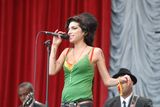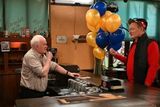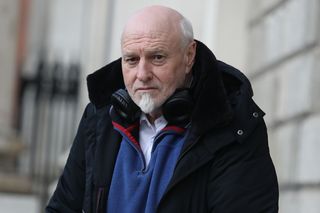Making Ireland funny again - meet the minds behind hits Derry Girls, The Young Offenders, Can't Cope Won't Cope
After a long hiatus, shows like Derry Girls and The Young Offenders have put home-grown comedy back on the map. Some of those behind the resurgence tell our reporter that the appeal lies not in their Irishness but their authenticity



No doubt about it, Irish television comedy is in the midst of a riveting run. Derry Girls, The Young Offenders, Bridget & Eamon and Can't Cope Won't Cope lead the way in giving us a chuckle at home, but critically for the audience figures and financial security, they've put Irish comedy back on the map. All four have been welcomed in the UK, and globally in the case of Can't Cope, with its Netflix distribution deal.
"TV comedy seems to come and go in waves," notes PJ Gallagher, who plays Principal Barry Walsh in The Young Offenders and is a veteran in the stand-up/TV comedy field.
"If you look back 25 years ago, there were great shows like The End and Nighthawks.
"Then there was a lull and 10 years later, there was Podge & Rodge, Des Bishop and, if I may, I'd like to include myself with Naked Camera and Anonymous. And of course there was Father Ted."
Can't Cope Won't Cope
Until the new crop of comedy, the first sign of which was Chris O'Dowd's Moone Boy, Graham Linehan and Arthur Mathews' show was the last to prove that Irish-penned comedy could compete on a global scale (Mrs Brown's Boys being more divisive). Father Ted completed its extensive run 20 years ago, but its legacy helped inspire the current crop of TV.
"It opened doors for my generation of Irish writers," says Lisa McGee, writer and creator of Derry Girls.
"I still remember watching the opening of that first episode, I was 14 and I instantly fell in love with it. It was so funny and clever, and while it was hugely popular with audiences outside of Ireland, I think Irish audiences appreciated another layer to it, a sort of inside joke."
This dual layer was also the key to Derry Girls' record-breaking success. The first series received an average of 2.5 million viewers, making it Channel 4's biggest comedy launch in five years, since Ricky Gervais's Derek. It shone a realistic light on being a Derry teenager while dealing with the realities of the Troubles - and the more complicated matters of convent school, friends and boys ("You can't marry an orange man, Michelle!" "That's a pity. I think there's something really sexy about the fact that they hate us so much").
If we question why the sudden interest in Irish stories, for McGee, it was a natural follow-on from London Irish, her comedy which received mixed reviews. Derry Girls merely continued McGee's relationship with Channel 4.
"I never really tried to sell the idea to them if I'm honest," she says. "It took about a year and a half to get the pilot episode into shape, working on other things and then coming back to it. When I and producers Liz Lewin and Caroline Leddy thought it was ready to show Channel 4, we took it to them. I don't think I could have sold an idea like Derry Girls with a document or in a pitch. It would have sounded too strange. We needed to get a script in front of them and get them laughing."
Derry Girls
Channel 4, the UK's home of alternative television, is also the home of Sharon Horgan and Rob Delaney's Catastrophe, another show that was brought to screens through the traditional model where a solid script was enough for it to be commissioned.
Bridget & Eamon and Damo and Ivor, meanwhile, took different routes, where they both started off as sketches on Republic of Telly that piqued enough interest to be turned into full series. Now, Damo and Ivor is on the silver screen, and Bridget & Eamon is being shown worldwide via UKTV Gold, Amazon and Hulu.
Indeed, the evolving way in which people watch telly, their rising expectations and the way programmes are financed, has opened up other avenues in the world of TV comedy. The hope is to harness this new model to create more appealing shows.
Ailish McElmeel of Deadpan Productions, the company behind comedy-dramas Nowhere Fast and Can't Cope Won't Cope, explains: "Before, it was a case that RTÉ, who make the majority of domestic television, weren't responsive to new television. The drama department didn't commission, and the comedy department had no budget. There's this idea that comedy is cheaper to produce but that's not true - in fact, people are likely to give an okay drama more of a chance than a comedy, so good production values are key.
"Once we could access great television on the internet, it was clear that there needed to be more investment. So a lot of effort went into building relationships with international organisations to make co-productions. It's also about making a show that appeal to a wide audience so it can be sold on to other countries."
The result of this new model can be seen with The Young Offenders, whose first series has just wrapped up after airing on RTÉ (where it received around 400,000 viewers an episode) and BBC Three, the Beeb's streaming channel aimed at younger audiences. Written, created and directed by Peter Foott, it follows loveable rouges Conor and Jock (Alex Murphy and Chris Walley) as they hatch hare-brained schemes in Cork city ("Think about the things your mam could do with five grand." "She could get a nice blouse or something."). It follows on from the excellent film of the same name, released last year.
"I think the BBC saw the film as a 90-minute long pilot," says PJ Gallagher, who switched roles after playing Ray, an unhinged drug dealer, in the film. "Really, Cork City is the biggest character in it, but at the same time, it could be shot anywhere in the world because it's just depicting young people very well. That's like Derry Girls. Both are written by people who remember what it's like to be young, so when an audience watches it, they know they're not being lied to."
Lisa agrees: "More than an appetite for stories from Ireland, I think there's a real appetite for authenticity, for exploring worlds that are less familiar to a television audience."
In which case, the future looks bright for quality TV. A second series of Derry Girls and The Young Offenders were signed off after the first episode of each, suggesting a continued buoyant scene. While Eddie Doyle, RTÉ's head of comedy who brought in the changes, has left for BBC Northern Ireland, RTÉ are continuing this momentum to become digitally and internationally focused. For example, Comedy Bites replaced Republic of Telly as a showcase for rising talent, and adult animated show Ends Meet aired on RTÉ Player before its run on RTÉ2 last month. There's also a joint-funding initiative with the Irish Film Board aimed specifically at new comedy scripts with international appeal - a shortlist of 10 was recently announced, and next year one will be developed into a six-part series.
Similarly, TV3 have plans for airing more original comedy. They've dabbled in it, with Jason Byrne's Snaptastic Show and more recently, stand-up comic Joanne McNally's documentary Baby Haters. But scripted comedy is on their radar for the future, especially now they're rebranding as Virgin Media TV under new, international owners.
"We've always been ambitious in drama, but comedy has to be handled carefully, as you want it to be of high quality and resonate with an Irish audience," says Andrew Byrne, the commissioning editor. "It also has to bring opportunities internationally, especially as we can easily feed into the bigger Virgin Media group. More than ever, we're open to this type of show."
With the audience, writers, producers, and channels all eager to find the next Derry Girls, it seems Irish comedy hasn't had its last laugh just yet.
Join the Irish Independent WhatsApp channel
Stay up to date with all the latest news



















